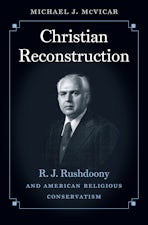William James
Psychical Research and the Challenge of Modernity
By Krister Dylan Knapp
400 pp., 6.125 x 9.25, 10 halftones, 1 table, notes, bibl., index
-
Hardcover ISBN: 978-1-4696-3124-0
Published: May 2017 -
E-book PDF ISBN: 979-8-8908-5270-0
Published: March 2017 -
Paperback ISBN: 978-1-4696-6875-8
Published: November 2021 -
E-book EPUB ISBN: 978-1-4696-3125-7
Published: March 2017
Buy this Book
- Hardcover $39.95
- Paperback $35.95
- E-Book $19.99
For Professors:
Free E-Exam Copies
Knapp explains how and why James found in psychical research a way to rethink the well-trodden approaches to classic Euro-American religious thought, typified by the oppositional categories of natural vs. supernatural and normal vs. paranormal. He demonstrates how James eschewed these choices and instead developed a tertiary synthesis of them, an approach Knapp terms tertium quid, the third way. Situating James's psychical research in relation to the rise of experimental psychology and Protestantism’s changing place in fin de siècle America, Knapp asserts that the third way illustrated a much broader trend in transatlantic thought as it struggled to navigate the uncertainties and religious adventurism of the modern age.
About the Author
Krister Dylan Knapp is senior lecturer in the department of history at Washington University in St. Louis.
For more information about Krister Dylan Knapp, visit
the
Author
Page.



